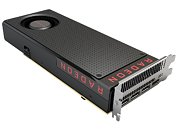Saturday, July 2nd 2016

Official Statement from AMD on the PCI-Express Overcurrent Issue
AMD sent us this statement in response to growing concern among our readers that the Radeon RX 480 graphics card violates PCI-Express power specification, by overdrawing power from its single 6-pin PCIe power connector and the PCI-Express slot. Combined, the total power budged of the card should be 150W, however, it was found to draw well over that power limit.
AMD has had out-of-spec power designs in the past with the Radeon R9 295X2, for example, but that card is targeted at buyers with reasonably good PSUs. The RX 480's target audience could face troubles powering the card. Below is AMD's statement on the matter. The company stated that it's working on a driver update that could cap the power at 150W. It will be interesting to see how that power-limit affects performance.
AMD has had out-of-spec power designs in the past with the Radeon R9 295X2, for example, but that card is targeted at buyers with reasonably good PSUs. The RX 480's target audience could face troubles powering the card. Below is AMD's statement on the matter. The company stated that it's working on a driver update that could cap the power at 150W. It will be interesting to see how that power-limit affects performance.
"As you know, we continuously tune our GPUs in order to maximize their performance within their given power envelopes and the speed of the memory interface, which in this case is an unprecedented 8 Gbps for GDDR5. Recently, we identified select scenarios where the tuning of some RX 480 boards was not optimal. Fortunately, we can adjust the GPU's tuning via software in order to resolve this issue. We are already testing a driver that implements a fix, and we will provide an update to the community on our progress on Tuesday (July 5, 2016)."

358 Comments on Official Statement from AMD on the PCI-Express Overcurrent Issue
The custom ones don't need to take this into consideration so they will clock very high (rumors say about +1400 MHz which will reach or even surpass stock 980).Driver fixable thing for those who don't know how to do it themselves, -10% in power settings for the current driver for those who want to do that now. And not any decrease in performance also. :toast:
As for the custom 480s, they will have alternative BIOS as usual and won't depend on default driver settings as usual.
There is a more technical solution, which does not change power draw or performance but that is still under investigation. Feasibility of that depends whether PCI-E bus and 6-pin are connected to parallel as input to all VREGs or they supply different parts of the VREGs.
@W1zzard are we gonna see a quick retest review with a handful of benchmarks with the revised driver to check this out?
Reducing operating voltage MAY work on some GPUs, but due to obvious negative effect on stability (there is a reason why they put the VID it has now) it is too risky to do on all cards.
Perhaps AMD gave the card a BIOS that allowed it to exceed PCIe spec because it wanted it to be reviewed in the best light, and knew reviewers sometimes do not investigate OC? Given how their clocks are "managed" compared to NVidia's Turbo, this actually seems like the most reasonable explanation for what happened. Not every site has the capability to accurately measure power consumption for PCIe devices, so many sites wouldn't even be able to test such an issue.
As if the gtx 970 or 960 is clean. this is only when you over clock. Try to do some research before commenting you sound like a idiot.
This is just some redit fanboy making a big deal of nothing. I didn't hear a cry when Nvidia came out with the 960 or 970.
Here a video I found to be correct.
Around midnight of the launch day, going into July 30th, market share ranked 74th. Today it is tied with the R9 290 at 17th and obviously going up. I'm betting it'll -- in terms of sales -- trade blows with the GTX 1070 from here on out and probably slightly surpass it at some point once the 4GB versions hit the market.
Not exactly DOA by my reckoning.
I just think Nvidia fanboys (who are up there with Apple and Nintendo, imo) were spring loaded to fire at any sudden movement after the 970 fiasco.
This says a lot about how biased you are as well.
GTX950 is a 90W card, so under normal circumstances, the only theoretical way it can overdraw power from PCI-E only if it draws no power from 6-pin connector at all (or if you own one of those newer bus-powered cards from ASUS or EVGA).
When it comes to motherboards, you'll be surprised how many shitty products hit the market nowadays. Just because it's high-end does not mean that it won't break.
wccftech.com/article/radeon-rx-480-reducing-voltage-increasing-efficiency/
And the ASUS gtx950 with no power connector pulls a maximum of 76w from the slot. So they managed to keep it right at the limit.